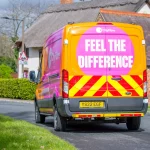UPDATE Labour Party Activists Seek 1Gbps Nationwide Broadband by 2020
Impossible promise or inevitable reality. The British Labour party has effectively kicked off their 2015 General Election campaign today by seeming to support new proposals from the Labour Digital group, which demands a “national focus on connectivity” that will deliver 1000Mbps (1Gbps) broadband to all homes and offices, with 10Gps connections for business hubs like Tech City.
The activists report contains no less than 82 proposals for the party’s future digital policy, which are said to cost around £10bn to implement over a five year period by 2020. Apparently these “ideas” and others contained in the report were crowd-sourced online by Labour Digital’s 300+ members following a launch event addressed by Baronness Lane (Martha Lane Fox) in March 2014.
Advertisement
At this stage it’s not clear which of the “ideas” will be adopted, although we’ve highlighted the broadband and Internet access related ones below. A separate report on the BBC suggests that the 1Gbps commitment will form part of an official policy announcement, although this has yet to be confirmed.
Labour Digital’s – Internet and Broadband Proposals
5. The UK should target nationwide access to 1Gbps broadband in homes, businesses and public buildings, with 10Gbps services for tech-clusters, as early possible in the next parliament. It is only through universal access to world class internet facilities that the economic and social benefits of the digital economy can be captured by all citizens. Although fixed line is the primary mechanism for broadband deployment, Government should also embrace wireless and satellite mechanisms where necessary to speed delivery of its targets.
6. Ofcom should use its regulatory powers to ensure that the entire UK is provided with reliable network coverage of at least 3G speeds, including all populated coastal and rural areas.
7. In ensuring mobile and community connectivity, a future government should require transport providers to offer reliable, blanket WiFi across their services. It should also require Network Rail to open access to its own mobile network (used exclusively by train staff) to passengers. In doing so, barriers to entry into the digital economy will be lowered, particularly for those individuals and businesses reliant on mobility and travel.
8. Furthermore, local councils should be resourced and encouraged to develop and expand existing public space WiFi networks to provide free internet access across public spaces, guaranteeing access to citizens and businesses in population centres. Councils would produce a yearly monitor of usage and impact to demonstrate the value generated in their local economies and communities.
9. The next government should update the ECC according to the reforms proposed by the Law Commission. This would update the Code in the light of 21st century developments and ensure the treatment of broadband infrastructure as a traditional utility and streamline the ability of network providers and landowners to reach agreements on the access to private property.
10. With the European Parliament voting to adopt a net neutrality proposal that will restrict ISP charges for faster internet access, a Labour government should declare support for national and EU-level net neutrality.
13. Furthermore, to ensure fair and universal access to the application of digital skills, government should assess the viability of providing free basic internet access to all citizens, possibly as a requirement for participation in 5G auctions or targeted at children eligible for free school meals.
So to recap, 1Gbps for everybody, free “basic Internet” access for all citizens (possibly as part of the future 5G auction – we can’t see commercial mobile operators jumping at that idea) and perhaps a Universal Service Obligation (USO) for broadband services so that they’re treated like a “traditional utility” (gas, water, electric etc.).
Some of the ideas, such as for universal 3G coverage, better public WiFi access, support for Net Neutrality and possibly even a broadband USO, seem to be potentially feasible approaches for the future. But others read more like a kids Christmas list, where the child asks for a real Ferrari even though they’ll probably only get a plastic model (unless you’re the son or daughter of a multi-billionaire).
Not that we wouldn’t welcome a policy that proposes to make Gigabit broadband services available to everybody in the country, in fact that would be amazing! But practical and economic realities have a tendency to become party poopers once “ideas” are required to be taken seriously and put through proper feasibility tests.
Advertisement
For example, you’d likely need a lot more than £10bn to roll-out a Fibre-to-the-Home (FTTH/P) network nationwide. It’s possible that match-funding might get you to the needed £20bn+ but that’s assuming anybody, even BT, could or would want do that in the first place (BT had enough trouble getting shareholders to release £3bn for FTTC and a little FTTP).
On the other hand new methods of deploying such services have since surfaced that can reduce the civil engineering costs significantly, although we still think that such a commitment would have more merit if it came alongside a significantly bigger allocation of public funding.
On top of that there’s no way that FTTH could be deployed to 100% of the country, assuming this is what the policy actually calls for, by 2020. Firstly you have to allow time to re-design a replacement Broadband Delivery UK (BDUK) process and that’s not going to be easy, then you have to go through the tender process and sort out funding.
Once all is said and done we’d already be into 2016/17 and you’ll certainly need more than the 3 remaining years to deploy FTTH nationwide (10-15 might be more realistic). Meanwhile what happens to the existing BDUK roll-out? Remote rural areas might be left to wait considerably longer if the dominant technology suddenly switches from FTTC to FTTH.
Advertisement
So while we’d welcome a commitment to deliver 1Gbps broadband for all and 10Gbps in so-called “tech-clusters“, in order to be credible such a pledge would need to be matched with a much larger pot of public investment and given an appropriate timescale for completion (2030+ perhaps).
A Labour Government would then have to consider the very real market implications, especially for competition. Giving all the money to BT isn’t going to go down well when you have TalkTalk, Sky Broadband, Virgin Media, CityFibre, Hyperoptic and so forth pushing hundreds of millions of private investment into the same area. The approach would need to be more inclusive than BDUK has been and that’s going to become very complicated.
NOTE: The current Broadband Delivery UK (BDUK) programme aims to make fixed superfast broadband (24Mbps+) speeds available to 95% of the country by 2017, with the potential to reach 100% by around 2020 with the allocation of future funding. So far this has gobbled up around £1.7bn of public money, both from the central government and local councils.
UPDATE 25th September 2014
Below is a comment from fibre optic ISP Hyperoptic.
Dana Tobak, Managing Director of Hyperoptic, said:
“Hyperoptic welcomes proposals from the Labour Digital group for nationwide access to gigabit broadband. With investment in Fibre-to-the-Premises (FTTP) there are immediate employment opportunities to build the infrastructure, and long term economic and social benefits to be gained from having future-proofed connectivity, which enables businesses and consumers to take advantage of all the internet has to offer.
The UK is the most internet-based major economy, but unlike many other developed countries, it is lacking a clear FTTP development program. Hyperoptic is leading the charge for gigabit connectivity in the UK and is expanding its footprint rapidly across the UK – we would welcome Government support to further fast-track the expansion of gigabit broadband.”
Mark is a professional technology writer, IT consultant and computer engineer from Dorset (England), he also founded ISPreview in 1999 and enjoys analysing the latest telecoms and broadband developments. Find me on X (Twitter), Mastodon, Facebook, BlueSky, Threads.net and Linkedin.
« Thousands Cut-off After Theft of BT Copper Telecoms Cable in Billingham

















































Comments are closed